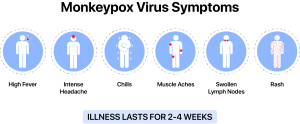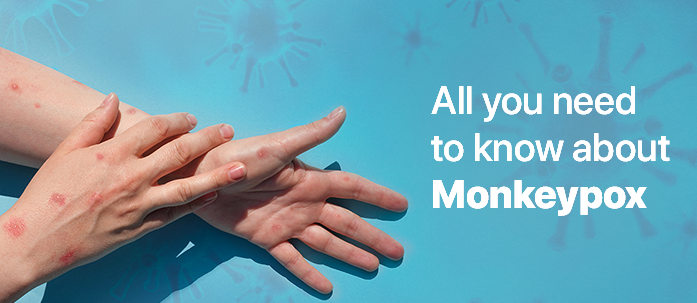Still, the current situation can be terrifying, especially for infected patients, their families, people with comorbidities, child-bearer, and new mothers. This article dedicates to a better understanding of the disease “Monkeypox.”
What is a Monkeypox?
Pox is the word for any viral disease that tends to produce pus-filled pustules and leaves a mark upon drying. Monkeypox is not known to be spread by monkeys and named because it was identified in African captive monkeys. Humans are usually protected from the zoonotic virus present in wild animals because of the ‘species barrier”. The recent Covid-19 breakout is a perfect example where a bat virus started evolving in humans.
The fatality rate of Monkeypox?
Studies have shown that the fatality rate for this disease is about 3-6%. However, it tends to prosper in patients with severe comorbidities like high blood pressure or cancer because of a weakened immune system. Pregnant women should take special care if infected with monkeypox or exposed to the virus because mothers can transmit the virus to the child resulting in stillbirth and early delivery.
Symptoms of Monkeypox
The incubation period of monkeypox is roughly between 1- 2 weeks but could be extended for some cases. Early symptoms like headache, muscle pains, fever, and fatigue mimic the common flu (influenza) symptoms. But after a few days, lesions might appear on the face and then spread all over the body, including genital and anal regions. They take a minimum of 10 days to dry and leave a dark spot on the skin.
Complicated cases of monkeypox may result in secondary infections, including severe eye infection, pnemonia, sepsis, and encephalitis (infection to the brain).

How is monkeypox detected?
Although a blood test could determine the presence of the monkeypox virus but, PCR testing provides more accurate results because of its sensitivity. The sample used for detection are skin lesion fluids, pustules, and dry crusts. In a few cases, even a biopsy could be prescribed.
How does monkeypox spread?
Monkeypox is a contagious disease that can spread through infected humans, animals, and materials. Following are the ways it mostly gets proliferated;
- Proximity to the infected person can get you monkeypox.
- Body fluids, respiratory secretions, and materials like beddings may transfer the virus.
- Infected animals could also spread monkeypox through bites or scratches
What precautions should be taken?
Monkeypox has been around the world for quite a time with a low infection rate. Still, it is advisable to take extra precautions to abstain from the disease.
Here’s a comprehensive approach you can follow;
- Before encountering monkeypox
- Should properly cook meat before eating
- Older people and those with comorbidities are more prone to monkeypox
- Pregnant women are advised to take special care as monkeypox infection may give rise to complications like stillbirth and premature delivery.
Note: No smallpox or monkeypox vaccine has been approved for pregnant women
- After encountering monkeypox:
- A person already vaccinated against smallpox is advised to take care of the infected person
- If you have a rash, keep it uncovered and dry. One should wash hands before touching the lesion
- Isolate yourself. Avoid contact with others until the pustule is dried/fallen off and new skin is formed
- Follow the medication that your physician provides
- Living with the patient
- Isolate yourself in a separate room
- Use different bathrooms
- It is advised to open the windows
- Avoid touching the patient
- If you are a caretaker, you should wear surgical masks and wash your hands frequently.
Do we have vaccines against monkeypox?
Studies reveal that the smallpox vaccine is 85% effective in preventing monkeypox with milder illnesses. But it is not available to the general public. As of now, two vaccines are approved by FDA for monkeypox infection. So far India has very less cases of monkeypox and it’s very unlikely to increase such as a pandemic. Hence, there is not much dialogue about the relevant usage/development of the monkeypox vaccine.
Is monkeypox similar to smallpox?
Smallpox has affected the entire world for over a century for two reasons; it was easily transmissible, and the mortality rate was approximately 30%. Finally, in 1980, the world was declared free from smallpox. Studies have shown that although monkeypox belongs to the same genus as smallpox, it is less contagious and not that severe. Also, the disease is milder in those who are vaccinated against smallpox in childhood.
Yoda suggests
The world has seen many pandemic outbreaks; the recent COVID-19 pandemic has left a scar on the planet. As monkeypox is one of the milder forms of the virus, it is not the time to panic. One should take all measures to protect themselves and others from getting the infection. For the same, it is essential to follow all safety protocols.
Yoda diagnostics excels in diagnosing contagious samples as we have a dedicated laboratory for highly contagious viral samples. Here at Yoda, 90% of the workflow is automated, allowing accurate diagnosis. We follow all the standard protocols for collection, testing, and disposal. So it is the right time to depend on us!























